Science Buddies
Science Buddies: I See a Full Moon Rising, and Shrinking, or Do I?
The moon appears bigger at the horizon just as it is rising over the treetops, than it does later in the evening when it is overhead. This is because our perception of its size changes based on where it is in the sky. In this human...
Exploratorium
Exploratorium: Science Snacks: Overlapping Spot
Do you know how to make a bright spot brighter? In this activity, your eyes will send conflicting information to the brain. See how you perceive what is on the paper.
Exploratorium
Exploratorium: Science Snacks: Anti Gravity Mirror
Using the property of reflection, this activity will have students appearing to defy gravity.
Exploratorium
Exploratorium: Science Snacks: Bronx Cheer Bulb
In this activity observe how light sources flash as you give them a raspberry. As you complete the activity, make a conclusion about what is wiggling the lights or you.
Exploratorium
Exploratorium: Science Snacks: Cheshire Cat
In this activity, you will trick your brain into thinking that your friend has disappeared except for their smile. Understand what happens when your eyes receive different images.
Exploratorium
Exploratorium: Science Snacks: Circles or Ovals?
Did you ever wonder why you have two eyes but only see one image? This activity will explore how your brain combines the images from your eyes in surprising ways. Learn about the dominant eye and how some people do not have one!
Exploratorium
Exploratorium: Science Snacks: Perception
Try one of these 33 perception activities in your classroom.
Other
Sandlot Science: The Ambiguous Cube Illusion [Pdf]
Plans for building a 3-D cube illusion. Useful for projects on perception and vision.
Optical Society
Optical Society of America: Optics for Kids: Exploring the Science of Light
A collection of information on the science of light and optics. Features a wide variety of resources: key events in history, reference materials, multimedia links, optical illusion activities, glossary of optics terms, and information on...
Science Museum of Minnesota
Science Museum of Minnesota: Tops
In this lesson make a spinning top to explore the concepts of shape, color, spinning, and optical illusions.
Other
Teaching Ideas for Primary Teachers: Science Ideas
A great resource to discover fun new activities to use in your classroom. Activities are age-appropriate, and span several science topics.
Sophia Learning
Sophia: Bill Nye: Once in a Mega Moon
Bill Nye explains why the moon appears smaller when it is higher in the sky, and he presents a Home Demo experiment that proves its an illusion. The experiment requires a bright moon on a clear night, a stiff piece of cardboard, and a...
Exploratorium
Exploratorium: Mona
An optical illusion created using Leonardo's well-known portrait of the Mona Lisa serves as source material for an exercise in perception.
Exploratorium
Exploratorium: Pajaro en Una Jaula
Two examples of optical illusions that demonstrate aspects of how we perceive color.
Exploratorium
Exploratorium: Science Snacks: Michelle O (Formerly Vanna)
Here is an activity where students experiment with how the brain receives a strange view of a familiar object.
Exploratorium
Exploratorium: Science Snacks: Color Contrast
Did you know that different-colored backgrounds cause colored objects to look different? In this investigation, students will experience this phenomenon.
Exploratorium
Exploratorium: Science Snacks: Depth Spinner
Observe adaptation and perception in the activity. This activity will have students watching a continuously rotation spiral to see what happens as you watch it and then look away.
Exploratorium
Exploratorium: Science Snacks: Gray Step
An activity to test your perception to see if you can distinguish between different shades of gray.
Exploratorium
Exploratorium: Science Snacks: Mirrorly a Window
Understand that what you see is often affected by your expectations of what you think you should see. This activity will explore the sensation you feel when your brain expects to see something.
Exploratorium
Exploratorium: Science Snacks: Looking a Little Spotty
By using digitally manipulated images, test your brain to see how much information is needed for your brain to produce an image.
Other
Sandlot Science: The Impossible Triangle [Pdf]
Plans for building a 3-D triangle with seemingly impossible structure. Good for projects and presentations.
Hanover College
Hanover College: Use of Visual Information in Art
This site from Hanover College gives a tutorial on issues of visual representation, such as depth, perspective, texture, shadow, illusion. Begins at an introductory level. Numerous pictures.
Curated OER
Science Kids: Science Images: Fraser Spiral Illusion, False Spiral
This optical illusion image is known as a Fraser spiral illusion, or false spiral. The black arcs appear to form a spiral when in fact they are a series of concentric circles.
Curated OER
Science Kids: Science Images: Orbison Illusion
This optical illusion, known as the Orbison illusion, gives the effect that the rectangle and inner square are distorted. This effect is caused by the horizontal V shaped lines.


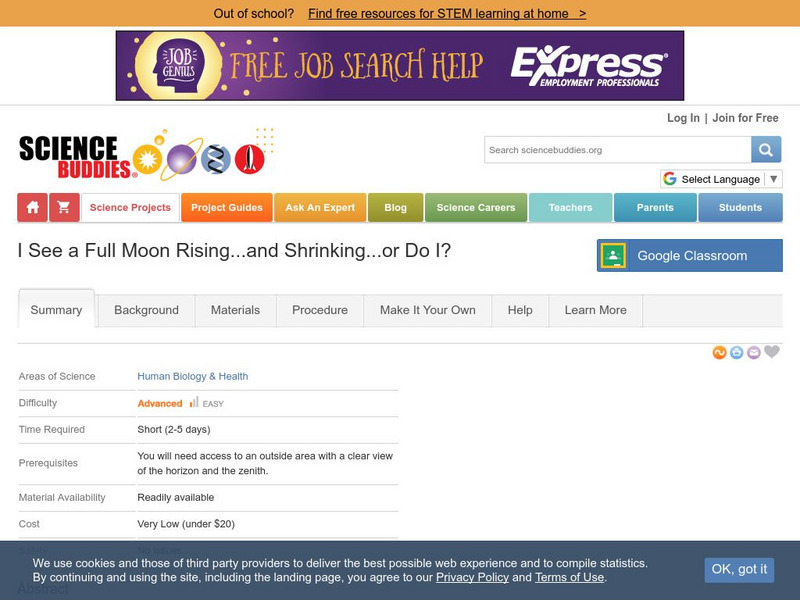





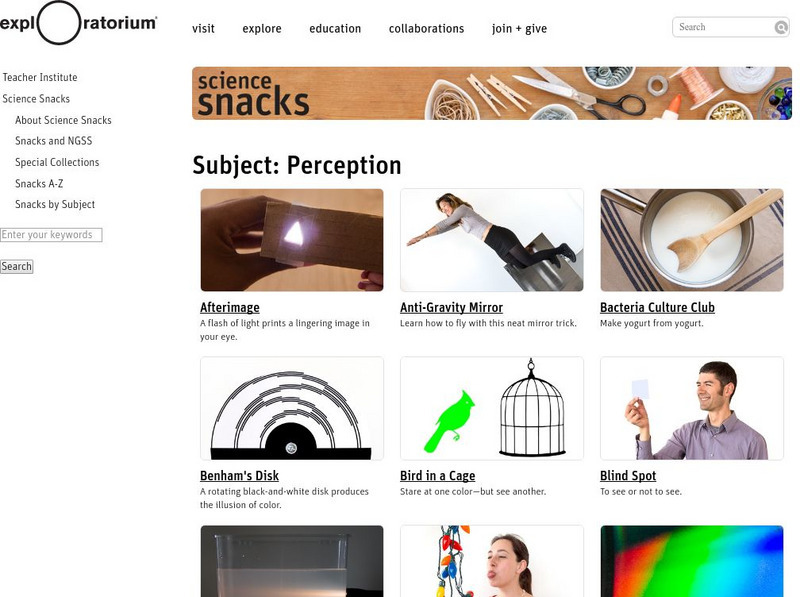
![Sandlot Science: The Ambiguous Cube Illusion [Pdf] Activity Sandlot Science: The Ambiguous Cube Illusion [Pdf] Activity](http://content.lessonplanet.com/resources/thumbnails/411251/large/bwluav9tywdpy2symdiwmduymc02mdkylte3n2libi5qcgc.jpg?1589993104)

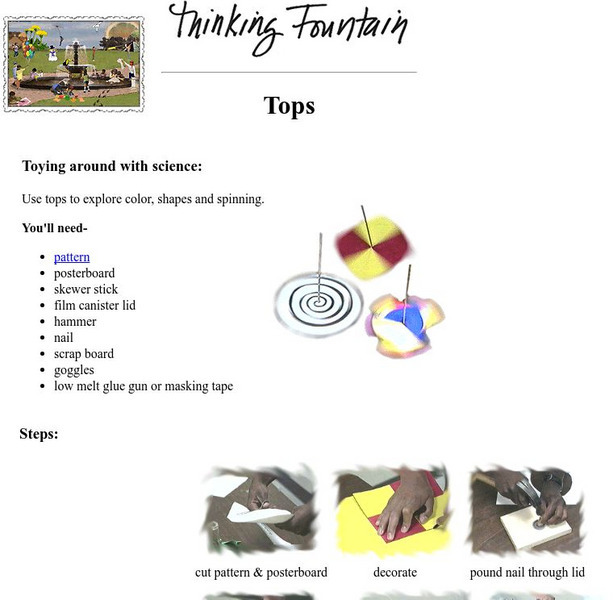



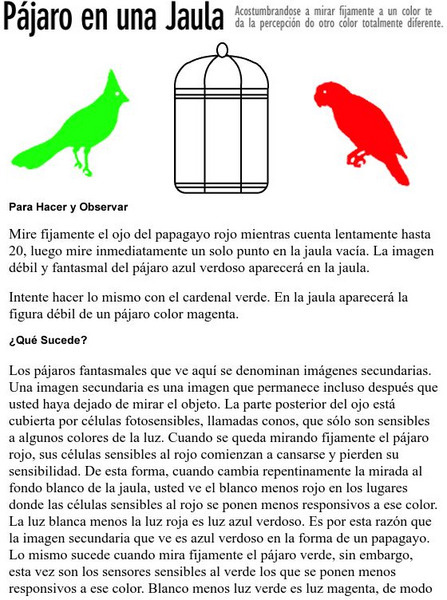



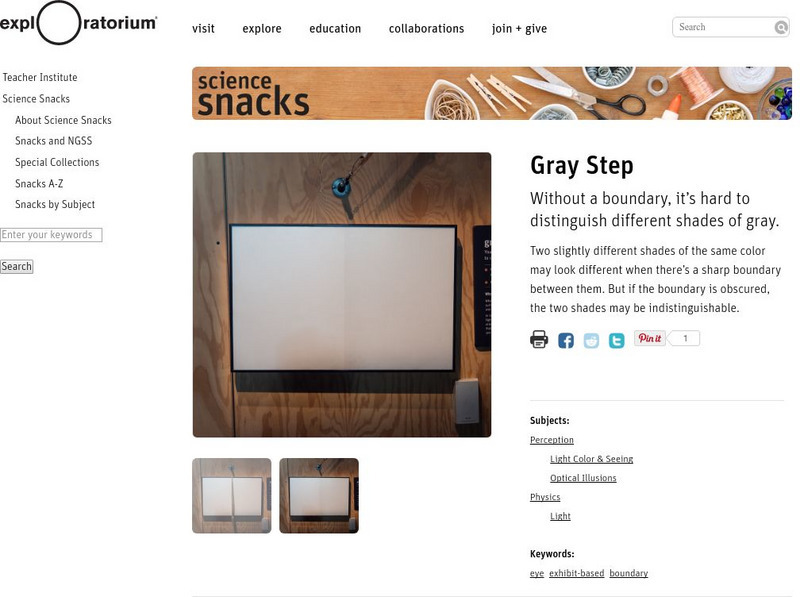


![Sandlot Science: The Impossible Triangle [Pdf] Activity Sandlot Science: The Impossible Triangle [Pdf] Activity](http://content.lessonplanet.com/resources/thumbnails/411256/large/bwluav9tywdpy2symdiwmduymc04otiwltflnzhom3uuanbn.jpg?1589993168)
